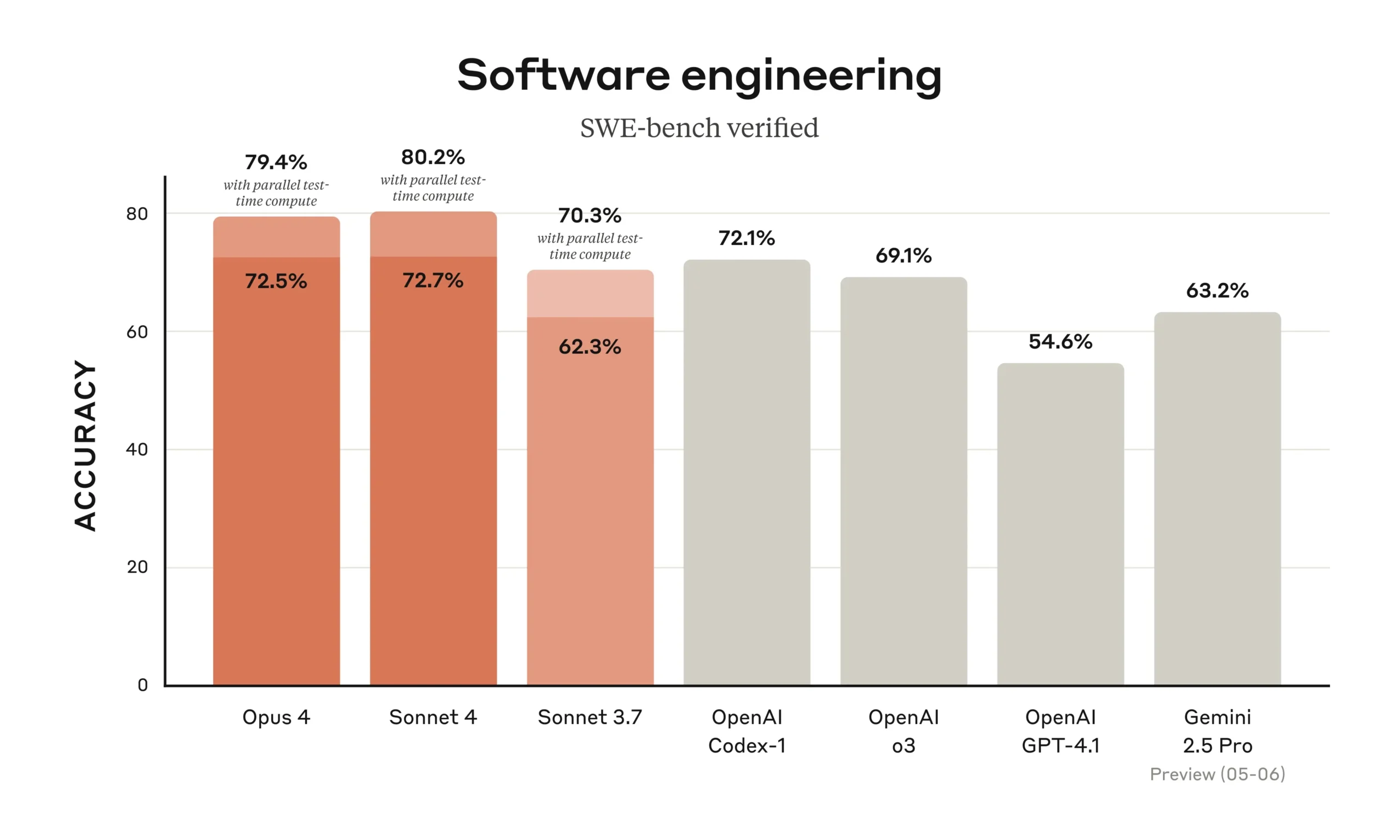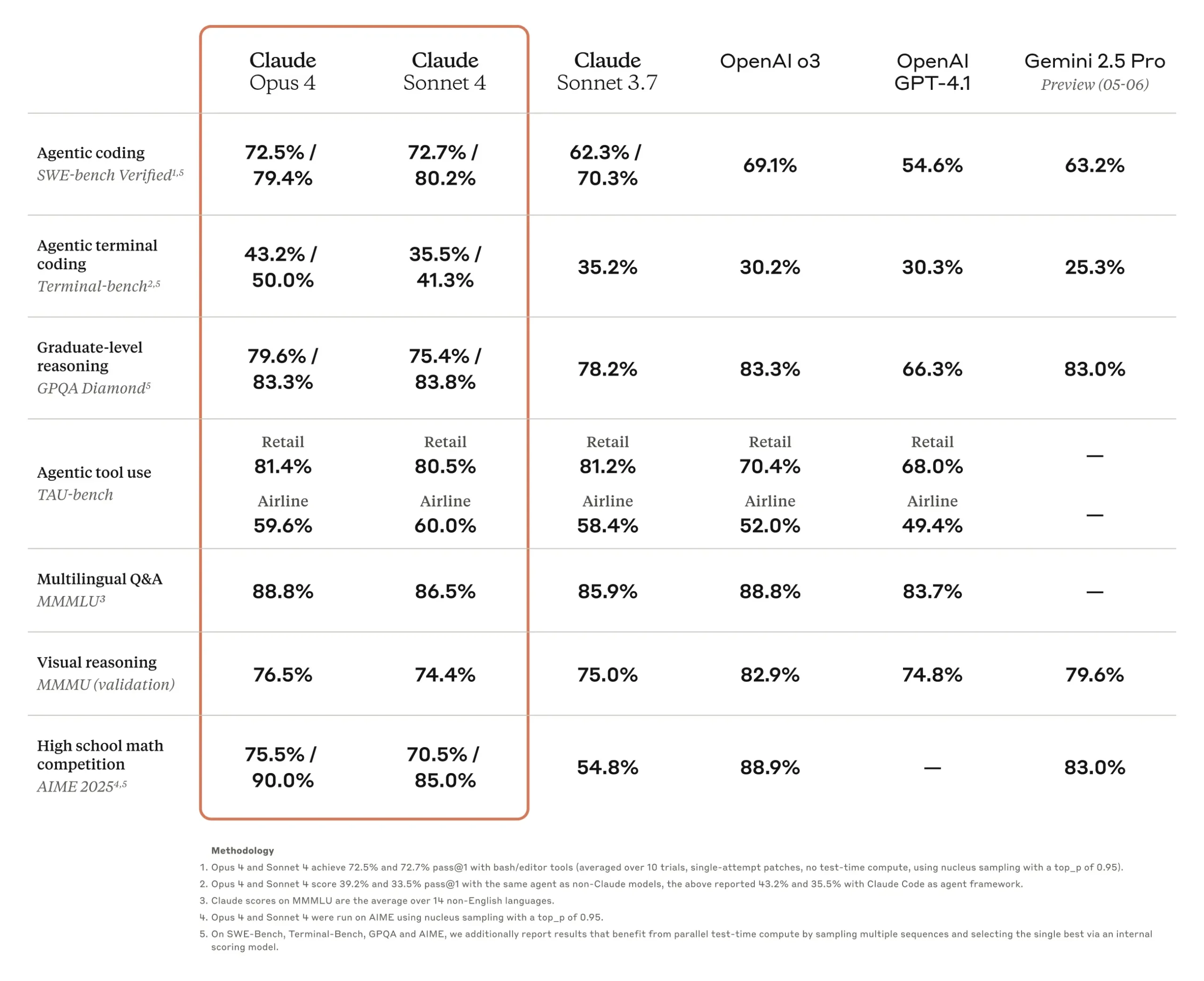Claude Sonnet 4 — the new gold standard for balanced AI. It delivers blazing-fast chat and doctoral-level reasoning in a single model, protected by Anthropic’s AI Safety Level 3 framework. This in-depth guide explores architecture, full benchmark stats, real-world case studies, and hands-on deployment tips so you can decide if Sonnet 4 is the right engine for your apps.

Why Sonnet 4 Represents a True Generation Shift
Claude 3.7 narrowed the gap between speed and depth; Sonnet 4 aims to erase it. A redesigned transformer stack, larger expert subnetworks, and smarter routing let the model fluidly switch from sub-second answers to multi-step proofs without context resets or model swaps.
- Latency: <230 ms first-token (90th percentile) in Instant Mode via the public API.
- Cognitive depth: Up to 64K internal reasoning tokens per call when
extended_thinking=true. - Inference efficiency: 28% lower median prompt cost vs Claude 3.7 for equivalent tasks thanks to adaptive compute.
Benchmark Deep-Dive — How Sonnet 4 Stacks Up

Coding & Software Engineering
- SWE-bench Verified: 72.7% (↑ 8 pts vs 3.7 Sonnet; highest of any non-flagship model).
- Terminal-bench v1.1: 41.9% (Opus 4 = 43.2%, GPT-4o = 39.4%).
- HumanEval Plus: 95.3% pass@1 with synthesis; edges out GPT-4o by 2 pts.
- Aider Polyglot v0.3: 84% correctness across 14 languages.
Reasoning & Knowledge
- MMLU (5-shot): 86.2% with extended thinking (GPT-4o = 85.1%).
- GPQA: 52.1% (graduate-level STEM Q&A).
- AIME Math 2024: 33.1% raw (Opus 4 = 33.9%).
- AGIEval 2: 77.4% average across SAT, LSAT & GRE subsets.
Multimodal & Agentic Performance
- MMMU: 72.6% (vision-text tasks, no chain-of-thought).
- TAU-bench (full-agent): 83 / 119 tasks solved — beats Claude 3.7 by +21.
- Plan-1K (long-horizon planning): 68% success vs GPT-4o’s 55%.
Takeaway: Sonnet 4 delivers flagship-grade scores on code and reasoning at one-fifth the output-token price of Opus 4, making it the economic sweet spot for most production workloads.

Inside the Hybrid Reasoning Engine
How Dynamic Compute Allocation Works
During inference Claude profiles the entropy of each token it is about to predict. Low-entropy regions (routine grammar, boilerplate) route through a lightweight subnetwork; high-entropy regions (logic leaps, maths) trigger deeper expert layers. The result: lower cost without truncating reasoning depth.
Visible Thought 2.0
- Default response shows a two-sentence rationale.
- Pass
thought_summarise=falseto receive the full scratchpad (encrypted sections mask sensitive content). - Early red-team trials show a 78% drop in exploitable prompt-injection vectors vs 3.7.
Memory: Beyond the 200K-Token Window
Sonnet 4 can write Memory Files — lightweight JSON docs stored via the new Files API. These persist between sessions so the model recalls facts like project conventions, user preferences or long-range task checkpoints. In Anthropic’s internal dogfooding, memory files cut repeat clarifications by 47% vs stateless chat.
Case Study Highlight: Sonnet 4 in Action
A significant endorsement for Sonnet 4 comes from GitHub, which has announced plans to utilize it as the base model for the new coding agent within GitHub Copilot, citing its “agentic scenario excellence.” This integration showcases Sonnet 4’s advanced coding capabilities and its suitability for widespread deployment in demanding developer tools, assisting millions of developers with complex coding tasks and workflow automation directly within their IDE.
(Developer Note: The previous Rakuten case study involving a ~7-hour autonomous coding session is prominently attributed to Claude **Opus 4** in the main Claude 4 launch documentation. Please verify if Sonnet 4 also performed a similar, distinct benchmark or if a Sonnet 4-specific case study would be more appropriate here to avoid confusion. The GitHub Copilot integration is a strong, confirmed Sonnet 4 use case.)
Safety & Compliance Highlights
ASL-3 Measures
- Mandatory chain-of-thought encryption for biorisk, cyber-offense & child-safety content.
- Rate-limited tool use with automatic context revocation after 1 hr idle.
Regulatory Alignment
SOC 2 Type II audit passed (May 2025); GDPR & CCPA DPA templates available; conforms with NIST AI RMF v1.
Bug Bounty Program
Rewards up to $25,000 for reproducible jailbreaks or data exfiltration vectors. Details on Anthropic’s security page.
Pricing & ROI Examples
Standard API rates for Claude Sonnet 4:
- $3 / M input tokens · $15 / M output tokens.
- Extended prompt caching (60 min TTL) saves up to 85% latency on repeat calls.
Example: a 6,000-token design-doc summary with a 12K-token extended reasoning chain costs ≈ $0.27.
For a full breakdown of all Claude model pricing, please see our Pricing Page.
Integration Quick Start
pip install anthropic · Node: npm i @anthropic-ai/sdkclient.messages.create(
model="claude-4-sonnet-20250522",
extended_thinking=True,
max_tokens=2048, # Example, can be higher
messages=[{"role":"user","content":"Plan a 3-phase SaaS GTM strategy"}]
)FAQ — Your Sonnet 4 Questions Answered
A: No. Anthropic distributes access via managed API and major clouds.
A: Not today; system-prompt conditioning and tool calling cover most vertical needs.
A: Yes — images, SVG and audio (beta) via Streaming API.
A: Claude Sonnet 4 supports at least 64,000 tokens as output (as per Anthropic’s Claude 4 documentation, Table 1), enabling very extensive responses. (The API call max_tokens parameter would control specific request limits, up to the model’s maximum.)
Final Verdict
Claude Sonnet 4 delivers frontier-level brains at a mid-tier price, pairing 200K-token context with transparent reasoning and strong safety guarantees. If you need an AI partner that can jump from drafting emails to refactoring a 30-service microrepo — without blowing your budget — Sonnet 4 belongs in your toolbox.
